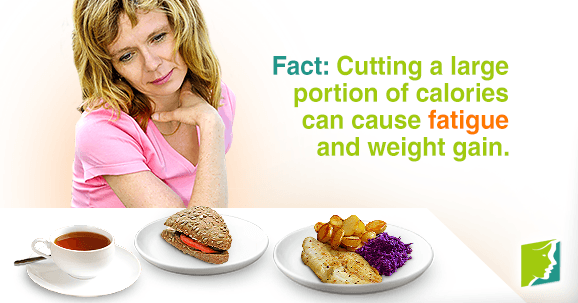There are countless diets out there that all claim to be the best, most effective way of losing weight quickly. The truth is, most of them are extremely unhealthy and ineffective. Many diets can leave you malnourished and fatigued. The best and healthiest way to diet and lose weight is to eat small, healthy meals and snacks, get plenty of exercise, and maintain a balanced lifestyle. This article discusses several myths and facts about diets that may cause fatigue.
MYTH: You Should Wait Until You're Hungry to Eat
FACT: You Should Never Skip Meals
Skipping meals causes hunger to build and become out of control, which typically results in overeating and fatigue. Waiting until you are hungry to eat usually leads to overeating unhealthy foods to satisfy that intense hunger. Additionally, skipping breakfast activates your body's insulin response, which triggers fat storage and weight gain. It is recommended to eat small, healthy snacks every few hours in addition to regular meals to stay healthy and boost energy levels.
MYTH: Fat Is Bad for You
FACT: It Is Important to Eat Good Fats to Stay Healthy
There is such a thing as good fats, and they are vital to maintaining a healthy balance. Good fats - also known as unsaturated fats - can be found in nuts (e.g., almonds and walnuts), fish, avocado, olives, and low-fat dairy. These good fats provide energy, help rebuild cells, and are involved in the production of hormones. Fats to avoid are saturated and trans fats that are found in foods like butter, red meat, and processed foods.
MYTH: Cutting a Lot of Calories to Lose Weight Is Safe and Effective
FACT: Cutting a Large Portion of Calories Can Cause Fatigue and Weight Gain
Studies have shown that cutting too many calories abruptly can cause fatigue and weight gain, because doing so jolts the body into “starvation mode”. When this happens, the body stores fat as a defense mechanism. Cutting out too many calories also causes fatigue, because the body does not have enough nutrients to maintain normal energy levels.
MYTH: Fat Free or Reduced Fat Foods Are Better for You
FACT: Fat Free Foods Are Typically Loaded with Unhealthy Additives
Fat free and reduced fat foods are typically packed with unhealthy additives that replace the flavor and texture which regular fat usually provides. These additives (e.g., sugars and thickeners) can contain more calories and be more fattening than natural fat. Read the nutrition labels on fat free and reduced fat items to learn about what you are ingesting.
Fat free diets can be tricky and typically not very effective. Even if you experience weight loss through a crash diet, it is likely that you will gain that weight back when you start eating normally again. Diets can also cause fatigue due to a lack of proper nutrients. The most effective way to diet is to maintain a healthy lifestyle, exercise regularly (at least three times a week), and eat small, healthy meals and snacks every three to four hours.
Sources
- National Health Service UK. (2013). Self-help tips to fight fatigue. Retrieved July 21, 2014, from http://www.nhs.uk/Livewell/tiredness-and-fatigue/Pages/self-help-energy-tips.aspx
- National Institutes of Health. (2014). Fatigue. Retrieved July 21, 2014, from http://www.nlm.nih.gov/medlineplus/fatigue.html
- Weight-control Information Network. (2014). Weight-loss and Nutrition Myths. Retrieved July, 21, 2014, from http://win.niddk.nih.gov/publications/myths.htm



